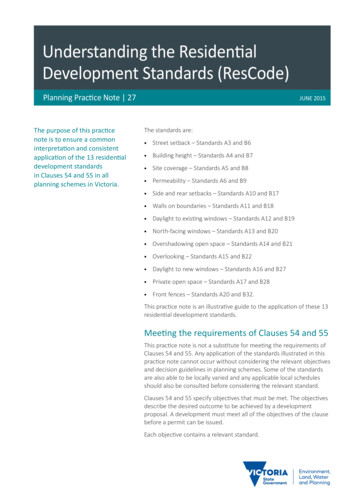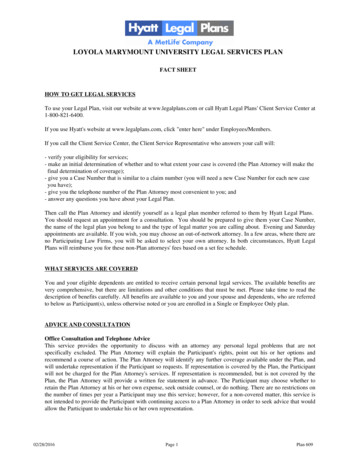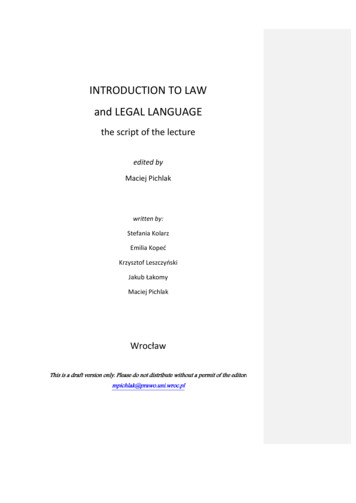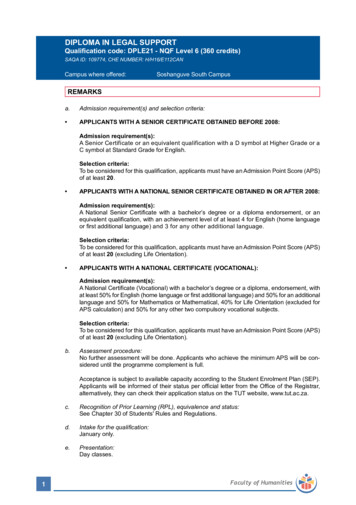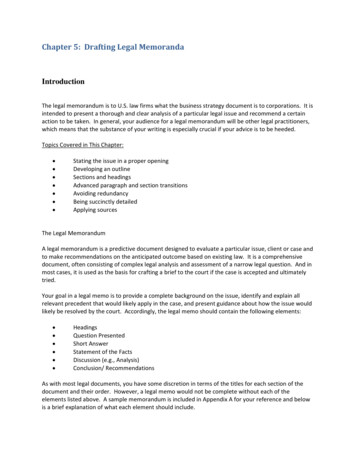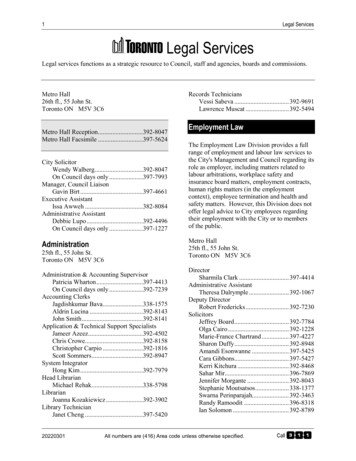
Transcription
Mi dP enn Le galServicesPer for ma nceSta nd ard sApril20 11
MidPenn Legal ServicesPerformance StandardsTABLE OF CONTENTSIntroductionI. Performance Standards Related to Client Relations and Projectinga Positive Public Image of MidPenn Legal Services1. Establishing an Effective Relationship with the Client2. Preserving Client Confidences3. Promoting Program Stature and CredibilityII. Performance Standards Related to Program Policies and Procedures4. Contribution to Program5. Implementation of Program Mission and Policies6. Community AdvocacyHI. Performance Standards Related to Resolving Client Problems Effectively7. Results of Representation8. Client Participation in the Conduct of the Representation9. tablishing a Clear Mutual Underst.a nding with.the Client10. Responsibilities Where Limited Representation is Provided11.·Case Planning12. File Maintenance13. Investigation14. Legal Research and Analysis15. Legal Counseling16. Negotiations17. Drafting Pleadings18. Motions19. Discovery20. Trial or Hearing Preparation and Presentation21. Appellate Practice22. Quality of Written Work23. Administrative Advocacy in Adjudicatory Administrative Hearings24. Legislative and Administrative Advocacy25. Community Legal Education26. Community Group 92121222223
MidPenn Legal ServicesPerforman ce Standards4/20/11INTRODUCfi ONThese Performance Standards were developed in part to assist MidPenn staff in moreclearly understanding and carrying out the mission and vision of the program:- to provide equal access to justice and high quality legal services;- to help our clients become independent and self-sufficient;- to treat our clients with dignity and respect;-to provide access to the courts in a broad range of civil legal matters;- to provide direct representation, advice, pro se clinics & community education;- to seek solutions to systemic problems that affect our clients.The American Bar Association Standards for the Provision of Civil Legal Aid and theLegal Services Corporation Performance Criteria were used as guidance in developingthese Performance Standards. Performance Standards 1 - 6 and 22 are generallyapplicable to all staff, although some provisions apply to advocates only or to attorneysonly, which should be evident from the wording and/or context. Performance Standards 7- 21 and 23 - 26 are generalJy applicable to advocates and in some cases only to attorneys,which should be evident from the wording and/or context. In addition, not every"Relevant Factor" listed under each standard wi11 be applicable in every case. Rather, thenature of the client's legal problem(s), the complexity of the issues and other relevantconsiderations will dictate the extent to which each "relevant factor" applies to a particularclient's ca.se.I.Performance Standards Related to Client Relations and Projecting a PositivePublic Image of MidPenn Legal Services.PERFORMANCE STANDARD 1: Establishing an Effective Relationship with theClientSTAFF SHOULD ESTABLISH A POSITIVE, EFFECTIVE, PROFESSIONALRELATIONSHIP WITH ALL CLIENTS IN AWAY WHICH FOSTERS CLIENTTRUST AND CONFIDENCE IN THE STAFF AND IN THE PROGRAM.The staff member treats the client courteously and sensitively, while demonstrating acommitment to preserving client dignity and overcoming such possible obstacles to aneffective relationship with the client as:a)Fear and mistrust of the legal profession;b)Lack of understanding of legal remedies;c)Disabilities or conditions which may impede communication or access;
d)Language and cultural barriers that may prevent effective communication.Relevant Factors include the following:1.The staff member shows respect for clients by answering phone calls in a respectfuland courteous manner; by beginning appointments on time; by promptly returningtelephone calls from clients; by treating clients respectfully and appropriately,avoiding conduct which may be perceived as short-tempered, rude, abrupt, hostile,or condescending.2.The staff member dresses appropriately whHe representing the program.3.The staff member seeks to preserve the goodwill of those who are denied service,by:a)Explaining clearly, accurately, promptly and courteously, the reasons forrejecting representation of the client;b)Explaining the procedures and rights available to a client who wishes areview of the decision declining representation, and volunteering suchinformation when a client complains or is upset about a lack of assistance;andc)Whenever possible, referring rejected applicants for service to other sourcesof assistance, after confirming that the referral offers a reasonablepossibility of assistance to the client.PERFORMANCE STANDARD 2: Preserving Client ConfidencesCONSISTENT WITH ETHICAL AND LEGAL RESPONSIBILIT IES, STAFFMUST PROTECT CLIENT INFORMATION FROM UNAUTHORIZE DDISCLOSURE.6Relevant Factors include the following:1.Attorney staff applies the PA. Rules of Professional Responsibility (Rule 1.6)relating to Confidentiality of Information, in a manner which exercises goodjudgment and consults with their managing or supervising attorney forguidance as necessary.2.Non-attorney staff(who are also obligated to comply with the PA. Rules ofProfessional Responsibility) must also protect client information fromunauthorized disclosure and should consult with their managing attorney asnecessary.2
3.The staff member does not leave files or client infonnation exposed on anydesk that is in a public area or in an area where confidential infonnation{including client identity) may be disclosed to other than MidPenn staff.4.The staff member does not interview the client in public areas such as waitingrooms or locations where persons other than MidPenn staff may overhearconversations.The staff member does not reveal the fact that the program is representing aclient, except as authorized by the client or required by law.5.6.In responding to an applicant for service who is unable to be representedbecause of a conflict of interest: with a current or a former client, the staffmember follows the program's Conflict oflnterest Determination Procedureand the Conflict of Interest Statement for Support Staff.7.The staff member does not discuss clients or cJient cases amongprogram staff when there may be other clients or non-programindividuals present.8.The staff member does not disclose infonnation regarding a client or anapplicant for services to a funding source or others, without first discussingthe request with and getting the approval of the Managing Attorney, theDirector of Advocacy or the Executive Director.PERFORMANCE STANDARD 3: Promoting Program Stature and CredibilitySTAFF MEMBERS SHOULD RECOGNIZ E THAT THEIR PROFICIEN CY ANDGOOD JUDGMENT ENHANCES THE INSTITUTIONAL STATURE ANDCREDIBILITY OF THE PROGRAM. WHICH IN TURN STRENGTH ENS ITSCAPACITY TO REPRESENT CLIENTS SUCCESSFULLY. MIDPENN STAFFMEMBERS ARE EXPECTED TO. PROMOTE A POSITIVE REPUTATION FORTHE PROGRAM.Relevant Factors include the following:I.The staff member shows a commitment to building effective relationships and areputation for high quality services for the program among clients, the communityat-large, adversaries, the legal community, including judges and other decision-.m 2.The staff member exercises sound judgment by making practical decisions,considering costs and benefits of approaches, setting and implementing priorities,seeking and providing guidance, and avoiding frivolous claims.3.The staff member is familiar with and abides by the rules of professional conductappropriate to the tribunal in which the client is being represented.3
II. Performance Standards Related to Program Policies and ProceduresPERFORMANCE STANDARD 4: Contribution to ProgramSTAFF IS EXPECTED TO WORK COOPERATIVE LY WITH OTHER STAFFMEMBERS AND PARTICIPATE ACTIVELY WITHIN THE PROGRAM ONISSUES OF IMPORTANCE.Relevant Factors include the following:1.The staff member demonstrates the ability to interact and communicate effectivelywith differing personality styles, developing good working relationships andabiding by the highest standards of truthfulness in dealings with MidPennsupervisors and co-workers.2.The staff member requests assistance to improve the quality and quantity of theirwork accepts constructive criticism and supervision and is willing to revise writtenwork product, or to modifY or acquire necessary advocacy skills according to·suggestions received.3.The staff member demonstrates a commitment to share expertise and experiencewith other Mid.Penn staff and is available for consultation about their skills andadvocacy.4.Advocates avoid contributing to ·unreasonable work demands placed upon supportstaff and are sensitive to issues of work flow (does not wait until the last minute toassign work) and gives clear and (when written) legible instructions to supportstaff.5.Advocates who are exempt staff may regularly work more than the schedulednumber of hours and are expected to do so when required by job responsibilities.PERFORMANCE STANDARD 5: Implementation of Program Mission and PoliciesSTAFF ACTS IN FURTHERENCE OF THE PROGRAM'S MISSION ANDCOMPLIES WITH PROGRAM POLICIES.Relevant Factors include the following:1.Legal work is within MidPenn's priorities, implements the program's mission, andis carried out in accordance with relevant program policies.2.The staff member demonstrates a commitment to and participates in effectiveadvocacy efforts to achieve long-tenn or systemic benefits for the client communityto meet client needs on legal problems within program priorities.4
3.The staff member knows and adheres to requirements of all funding sources andMidPenn policies and procedures.4.The staff member is aware of the importance of compliance with funderrequirements, including but not limited to the LSC requirements for thecontemporaneous entry by advocates into the program's data base of time spent oncases, matters and supporting activities; written attestation of citizenship ordocumentation of eligible alien status in cases involving in-person contact with theclient or representation beyond counsel or advice or limited action; verification offinancial eligibility with regard to income and assets; written retainer agreements inextended service cases; timely closing of cases after legal assistance has ceased.5. The staff member manages their time effectively, is flexible, reliable and is able toadapt to changes.6.The staff member continues to develop job-related skills and proficiency.7.The staff member helps cover other staff member responsibilities in emergenciesand understands the need to accept more responsibilities during crisis oremergency situations.PERFORMA NCE STANDARD 6: Community AdvocacySTAFF IS ENGAGED WITH THE CLIENT COMMUNITY AND COMMUNITYGROUPSRelevant Factors include the following:1.The staff member functions as a community advocate for the needs of poor personsby interacting with the client community within the relevant service area, in orderto:a)Remain aware of clients' changing circumstances and legal needs;b)Advise clients regarding changes in laws and regulations and problemsthey face that they may not ·recognize as presenting legal issues; andc)Keep the client population infonned regarding MidPenn's services.2.As appropriate, the staff member facilitates and extends the presence ofMidPenn inthe client community, by serving on boards of directors and other governing bodiesof community-based organizations and representing community-based clientgroups.3.As appropriate, the staff member regularly and effectively links his or her advocacyin substantive law areas with participation in or involvement with other human5
services providers, nonprofit organizations, community and client groups, andgovernment agencies.Ill. Performance Standards Related to Resolving Client Problems EffectivelyPERFORMANCE STANDARD 7: Results of RepresentationADVOCATES SHOULD ENGAGE IN WORK DESIGNED TO ATTAIN LASTINGRESULTS RESPONSIVE TO THE PROGRAM'S MISSION, VISION ANDSTRATEGIC PLAN.Relevant Factors include the following:1.The advocate pursues the client's objective zealously within the confines of the Jaw,through high quality representation.2.ln those instances where the advocate identifies Jaws, policies, or practices thatactively work to the detriment of the client's interests, or which are ignored,misapplied, or applied inconsistently by agencies or individuals in a way that harmsclients, the advocate demonstrates a willingness and ability, where appropriate, toengage in multiple forms of advocacy, consistent with funding restrictions,including:a) Non-representational strategies including participation on bar and judicialcommittees.b) Systemic impact in individual cases to bring attention to a particular issue andto compel a change over time.c) Informal intervention with higher placed officials in an administrative agencyto bring about a change in practice or procedures.d) Working with coalitions to address policy issues which affect the clientcommunity.e) Affirmative litigation involving complex statutory or constitutional questions.f) ln instances where seeking class action relief, legislative or administrativeadvocacy or other means of advocacy restricted by LSC regulations appearsappropriate to properly represent the clients' interests, seeking the assistance ofan unrestricted entity such as Community Justice Project, private pro bonocounsel or others to take over or assist with the representation.6
3.Advocates are encouraged to undertake impact work in their area of practice or in arelated area, commensurate with the advocate's experience, that furthers MidPenn'smission, vision, priorities, and strategic plan.PERFORMANCE STANDARD 8: Client Participation in the Conduct of theRepresentationSUBJECT TO LEGAL AND ETHICAL OBLIGATIONS, ADVOCATES MUSTABIDE BY CLIENT DECISIONS REGARDING THE OBJECTIVES OF THEREPRESENTATION AND MUST CONSULT WITH CLIENTS REGARDING THEMEANS USED TO ACHIEVE THOSE OBJECTIVES AND MUST KEEP THECLJENT REASONABLY INFORMED OF THE STATUS OF THE MATTER.Relevant Factors include the following:I.The advocate defers to the client regarding the objectives of the legal representationand is careful to avoid substituting his/her judgment for that of the client.2.The advocate uses professional skills to identify strategic options for resolving theclient's problem and explains the potential risks and consequences of each, so thatthe client can meaningfully participate in decisions regarding major case strategy.3.The advocate informs the client ofthe expectation that the client will, whenappropriate, assist in the preparation of the case, by helping to identify and locatewitnesses, documents or physical evidence, cooperating with discovery requests,·and keeping documentation and records.4.The advocate consults with the client regarding the means to be used to accomplishthe client's objectives, with respect to all but minor, technical, or unavoidablyemergent decisions about the case.5.In group representation, the advocate clarifies that the advocate's proper role is toadvise the group, not to lead it.6.If the client indicates an interest in pursuing a frivolous or malicious claim,presenting false evidence, or engaging in other illegal activity in the representation,the advocate explains the applicable ethical prohibitions and, if appropriate, timelyseeks withdrawal as counsel of record.7.In active, open cases, the advocate ordinarily maintains contact with each client atleast every 30 days.8.In cases that are inactive or pending an appeal, the advocate ordinarily maintainsclient contact at least every 90 days.7
9.The advocate informs the client promptly of major developments in the case, orwhere new or revised strategies are required.I 0.The advocate responds promptly (ordinarily the same day or the next day) toreasonabl requests from the client for infonnation about the case.11.When appropriate, the advocate gives the client copies of major correspondence andpleadings (i.e. complaint, answer, settlement proposal, etc.).12.The advocate makes particular efforts to communicate meaningfully with clients withspecial circumstances such as physical or mental disabilities, limited Englishproficiency, illiteracy or other limitations which may make communication orunderstanding more difficult.PERFORM ANCE STANDARD 9: Establishing a Clear Mutual Understan ding withthe ClientADVOCATES SEEK TO MAINTAIN A CLEAR MUTUAL UNDERSTANDINGWITH EACH CLIENT THROUG HOUT THE REPRESE NTATION , BEGINNINGWITH AN INITIAL EXPLORA TION OF THE CLIENT'S PROBLEMRelevant Factors include the following:1.Before the initial interview, the advocate becomes familiar with the informationgathered by MidPenn intake workers.2.The advocate conducts the interview in a way that promotes the full developmentof facts leading to the legal problem(s) and related problems that the client hopes toresolve. This includes the following elements, where warranted and as appropriate:a)Establishing rapport with the client and placing the client at ease;b)Identifying the advocate;c)Explaining how the program works;d)Explaining the purpose of the interview;e)Eliciting the client's problem(s);f)Organizing the presented facts;g)Providing counsel and advice;h)Explaining what MidPenn can do, including any limitations on the offeredrepresentation;8
3.4.i)Exploring other resources;j)Describing the next immediate step;k)Allowing and encouraging the client to ask questions;1)Except for counsel and advice matters, explaining the retainer agreement tothe client, including writing a description of what the advocate agrees to do,and ensuring that the client executes the original and receives a copy of theretainer; andm)Accompanying the client out of the office at the end of the interview.For transactional representation such as drafting of simple wills, powers of attorneyand similar documents, the advocate fully explains the purpose and effect of thedocument(s) and provides competent and diligent legal assistance.The advocate advises the client at the outset of representation that appeals fromcourt or administrative decisions are not automatic and that a separate decision onwhether to represent the client in further appeals will be made, if necessary.5.The advocate is alert to the possibility of an undiscovered conflict of interest with acurrent or previous client of MidPenn and cooperates fully with program policy andprocedures regarding conflicts.6.In situations involving client groups or many family members, the advocate reachesagreement with the client at the outset on who has the authority to decide whataction to take in the representation, in order to avoid potential conflicts of interest.7.The advocate strives to reach agreement with the client regarding theresponsibilities each has in the case.8.The advocate attempts to ensure that the client is aware of the importance ofkeeping the program infonned of changes in circumstances affecting their case andadvising the program of any change of address or telephone number.PERFO RMAN CE STAND ARD 10: Responsibilities Where Limited Represe ntationis ProvidedADVOC ATES MAY LIMIT THE SCOPE OF REPRE SENTA TION PROVI DEDTO A CLIEN T IF THE LIMITA TION IS REASO NABLE UNDER THECIRCU MSTAN CES AND THE CLIEN T KNOW INGLY CONSE NTSRelevant Factors include the following:9
I.The advocate adequately informs each client of the limited nature of theassistance and deteim jnes that the client agrees to proceed knowing thatlimitation.2.The advocate devotes adequate time to fully inquire into the facts of the client'ssituation and applies the law with a full understanding of those facts.3.The advocate adequately informs the client about the probable actions/developments that the client will face and practical steps that should be taken tomitigate their effect.4.The advocate providing advice, exercises sound professional judgment indeciding what advice will be the most useful based on the client's objective, thepertinent Jaw and the client's ability to act on that advice.5.The advocate takes care to assure that clients who, because of circumstancessuch as physical or mental disability, illiteracy, or limited English proficiency,will not be able to follow through on the limited assistance offered, are eitherreferred to another MidPenn advocate or are otherwise provided the kind ofassistance necessary to resolve the client's problem, or where such is not·possible, that the client is advised what is likely to happen.6.The advocate who provides oral advice to a cJient by telephone, follows upsuch advice with a written summary of the key points, either by letter orbrochure, sent shortly after the telephone contact, except in circumstanceswhere to do so could endanger the client or would otherwise be inappropriate.7.In situations where MidPenn has programmatically determined that theprovision of limited representation by way of counsel and advice or limitedaction, is generally appropriate in particular types of cases, through itsTelephone Advice Project or through the application of the program's CaseAcceptance Guidelines, advocates should nonetheless be awar of and applythese standards.PERFORMANCE STANDARD 11: Case PlanningTHE ADVOCATE DETERMINES A COURSE OF ACTION FOR HANDLINGTHE CLIENT'S CASE THAT IDENTIFIES APPLICABLE LAW ANDAVAILABLE REMEDIES AND ENABLES THE CLIENT AND ADVOCATE TOMAKE KNOWLEDGABLE DECISIONS TO PURSUE THE CLIENT'SOBJECTIVES.Relevant Factors include the following:I.Case planning should involve an open ended evaluation of the facts presentedand an identification of the legal issues that arise from those facts.10
2.Case planning should consider a number of factors that can effect the outcome ofthe case, including the client's willingness and commitment to pursue a lengthystrategy or desire for a quick resolution; or in appropriate circumstances, theexistence of other members of the low income community who may have a stake inthe outcome of the case.3.Case planning creates a tentative road map for handling a case to achieve theclie t's desired objective. At its earliest stage, the advocate presents the client withvarious options that may be pursued.4The case plan should be regularly reviewed and adjusted in response to significantdevelopments in the case. The client should be consulted when these developmentsoccur and should participate in making key strategic decisions.5.When a case strategy is adopted, key steps for implementation should bedetennined, with a finn timetable for their completion. A finn timetable isimportant so that, to the extent practicable, the advocate controls the pace anddirection of the case, rather than the adverse party.6.If more than one advocate is involved in handling the case, responsibilitiesshould be specifically assigned.7.Resources necessary to pursue the case, including the assistance of other advocatesor need for litigation funds for depositions or expert witnesses, should be identifiedand requested.8.In the specific context of litigation, the advocate engages in long-range strategyplanning which includes the following:9.a)IdentifYing the facts that must be obtain.ed through discovery and othermeans;b)IdentifYing the legal issues requiring research;c)Assessing the opponent's probable response and how it may be countered;d)Estimating the resources necessary and available to pursue the client'sobjective; ande)Assessing the probable costs to the opponent and their possible impact ontheir willingness to negotiate and compromise.In extended service cases, where deemed appropriate by the advocate's legalsupervisor, the advocate completes and updates a Case Planning Checklist forreview by and discussion with the legal supervisor.11
10.The advocate prepares for litigation assuming the client's claim or defense has to beestablished at a full trial or hearing.11.The advocate identifies legal issues that could be the basis for an appeal to ensurethat a sufficient record is created.PERFORMANCE STANDARD 12: File MaintenanceTHE ADVOCATE SHOULD MAINTAIN A NEAT AND ORDERLY CASE FILEWHICH FULLY DOCUMENTS ALL OF THE LEGAL ASSISTANCE PROVIDEDAND IS COMPLIANT WITH ALL REGULATORY REQUIREMENT S.Relevant Factors include the following:I.Client case files should be kept neat and orderly, such that another advocate, ifnecessary, could pick up the file and with relative ease, determine the issues,status, next steps and assume responsibility for client representation with aminimum of confusion.2.AU files should contain legible contemporaneous notes of conversations withclients, witnesses, opposing parties I attorneys or others connected with thecase. If notes of such conversations are recorded in the case managementsystem, they should be printed and placed in the physical file before closing.3.The Intake Sheets, Asset Fonn, Client Retainer (if applicable), CID Fonn (ifapplicable) and any other administrative fonns should be kept together at the·bottom of and on one side of the file folder.4.All documents including file notes, letters, court pleadings and orders should bekept in reverse chronological order, with the most recent item nearest the top ofthe file. Variations on this theme which segregate certain documents to oneside of the file are acceptable, provided they are also kept in reversechronological order.5.At such time as an open case file grows in size and/or complexity, it willbecome necessary to create separate folders to be placed in a large expandablefile folder and to group the file contents in some other organized fashion, suchas separate folders for notes, correspondence, pleadings, discovery,documentary evidence, research, etc. with each folder appropriately labeled.6.At time of closing, documents within files should be organized and separatefolders in large case files should be labeled appropriately.12
7.A II files, including brief service by telephone, should contain cleardocumentation of the legal advice given and/or service provided to the client.8.All files, including brief service by telephone, should contain a copy of aclosing letter sent to the client, or an acceptable explanation why no closingJetter was sent. Where the client is limited in their ability to understandEnglish, the closing letter should either be translated into the language that isunderstandable to them or some other arrangem ent should be made for theclient to become aware of the information being commun icated in the letter.9.Closing letters should indicate in clear languag e which is understandable to theclient, the nature of the problem for which they sought legal assistanc e and a.s ummary of the advice or service which the advocat e was able to provide; areminde r of any other information deemed important for the client toremember; an indication that the client's file is being closed and the reason forthis; the advocates willingness to accept phone calls to answer question s thatthe client may have; and the ability of the client to reapply for assistance in thefuture if the need should arise.10.Closing letters, as well as all letters and communications with clients, should becourteous and professional, yet convey a sense of empathy and concern for theclient's well-being.PERFORMANCE STANDARD 13: Investig ationTHE ADVOCATE SHOULD INVESTIGATE EACH CLIEN T PROBL EM TOESTABLISH ACCURATE AND THORO UGH KNOWLEDGE OF ALLRELEVANT FACTS.Relevan t Factors include the following:1.The advocate begins gathering information promptl y upon undertak ing a matter,unless there is a reasonable strategic reason not to, which is noted in the file.2.The advocate is attentive to the need to uncover unfavorable facts, as well asfavorable ones.3.The advocate organizes the facts in relation to the legal issues, in order to evaluatetheir impact on the client's objectives and to identify the need for furtherinvestigation.4.The advocate records the results of the investig ation in contemp oraneou s writtennotes for the case file or electronic entries in the case managem ent system. Asappropriate, this includes:13
a)Interviewing witnesses and informally contacting opposing counsel or anunrepresented adversary to obtain the facts asserted by the opponent;b)Obtaining documents in the client's possession and those available throughdiscovery, or obtainable as public records under state or federal law;c)Personally observing the scene at which key events took place; andd)Taking photographs.e)After notice to the client, conducting a criminal records check of the client,opposing party and other persons as well as a check of personal web pagesof such persons on Myspace, Facebook or other similar social network siteswhere the results may be relevant to issues involved in the case.PERFORM ANCE STANDAR D 14: Legal Research and AnalysisTHE ADVOCA TE SHOULD ANALYZE EACH MATTER WHEN NECESSA RYAND APPROPR IATE, AND DOCUME NT THE RESEARC H CONDUCT EDREGARDI NG PERTINE NT ISSUES, IN ORDER TO DETERM INE THERELATIO NSHIP BETWEEN THE CLIENT'S PROBLEM AND EXISTING LAWRelevant Factors include the following:1.The advocate conducts preliminary research that fonns the basis of tentative legaltheories that shape potential case strategy.2.The advocate continues to conduct legal research and analysis as part of an ongoingreevaluation of strategies and theories, to concentrate efforts on those issues thatare most relevant and critical to resolving the client's problem.3.The advocate reduces legal research and analysis to writing which is kept in thecase file. This writing shou)d include a discussion of favorable and unfavorable lawdiscovered in research.4.The advocate does not rely exclusively upon secondary sources such as treatises,instead directly reviews primary sources in order to allow consideration of theirrelevance to the client's probl m and to obtain full comprehension of the legalissues involved.5.The advocate makes certain that each consulted source of legal research iscurrent.6.When research indicates that a client's
MidPenn Legal Services Performance Standards 4/20/11 These Performance Standards were developed in part to assist MidPenn staff more clearly understanding and carrying out the mission and vision of the program: -to provide equal access to justice and high quality legal services; - to help our clients become independent and self-sufficient;
